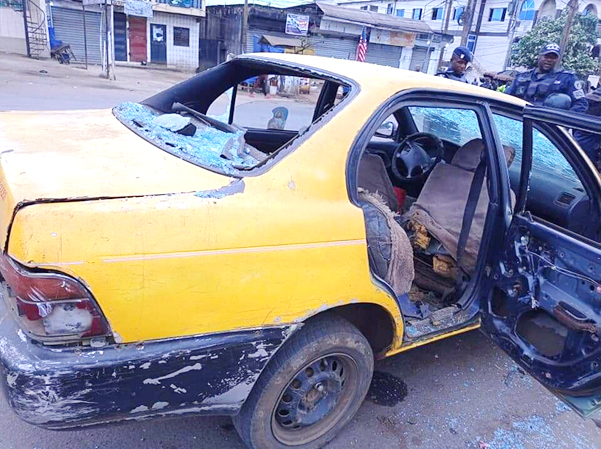In recent weeks,Buea has recorded a trend, whereby taxi drivers who operate on Monday, a day imposed by separatists as ghost town, are attacked either with guns or explosive devices.
This new trend has left observers with the impression that Buea may either be slipping back to days of insecurity or witnessing a new trend in operations meant to implement the separatists’ imposed Monday ghost towns that effectively put on hold commercial activities in the regional capital like most parts of the war-torn Anglophone regions of Cameroon.
On Monday, November 8, an explosive device was thrown in a moving taxi in Buea by someone who posed as a passenger. It exploded, killing the driver, Feugang Baudel-Laire, who was the lone occupant. The incident occurred beside a popular snack bar in Molyko Buea. The 33-year old’s remains were interred on November 11.
The previous Monday, November 1, another taxi was targeted at Checkpoint, Buea. The attacker who had also posed as a passenger threw an explosive device into the car. The driver realised it and dashed out just as the explosive device went off. It destroyed the car, but the driver survived the attack. Checkpoint, the neighbourhood in Buea where the incident occurred, is an open place, usually manned by police officers, whose station is just about 200 metres away from the junction.
Before then, other drivers were targeted in Buea. At Mile 18, the stretch from the Mile 17, Motor Park to Muea in the outskirts of Buea, two drivers were shot on a single day, months back, for working on a Monday.
Separatist groups operating around the town have claimed responsibility for some of these incidents.
In other cases, several drivers have had their cars burnt. Some taxis identified as working on Mondays have been tracked and burnt down. But however, the new trend of throwing explosives in moving cars exposes several civilians who can be killed as a result of this practice. On Wednesday, November 10, what appeared like a grenade went off in the corridor of a lecture hall in the University of Buea.
The prevention of movement and consequent attacks on those working on Monday however contravenes article 12 of the African Charter on Human and Peoples’ Rights. The law states that, “Every individual shall have the right to freedom of movement and residence within the borders of a State provided he abides by the law.” Such rights cannot be enjoyed when taxis are attacked for working on a particular day.
The attack on Monday, November 8, that killed a taxi driver in Buea also flouts the Universal Declaration of Human Rights’ Article 3 which states that everyone has the right to life, liberty and the security of person.
Article 19 of the declaration also states that, “Everyone has the right to freedom of opinion and expression; this right includes freedom to hold opinions without interference and to seek, receive and impart information and ideas through any media and regardless of frontiers. (Freedom to or not to support or respect ghost towns). As such civil disobedience, like ghost towns, should not be implemented at the threat to life, as people have a right to choose.
Still on the right to movement, the International Covenant on Civil and Political Rights in its article 11 of Part 3 (1) says, “Everyone lawfully within the territory of a State shall, within that territory, have the right to liberty of movement and freedom to choose his residence.”
In a statement issued in relation to the increased use of IEDs in Buea, the Centre For Human Rights and Democracy in Africa of rights defender, Agbor Nkongho, condemned the act saying, “The increasing use of IEDs in Buea within the space of one week with the intention to cause fear and to reinforce the respect of ghost towns and school boycott has been a strategy of none state armed groups.”
Leaders of taxi drivers in Buea who were contacted to react to the attacks could not do so, for fear of their security. However, the promised security to the drivers seems to be falling short, as the available security officers are unable to cover the whole town. Even in areas like Checkpoint where they maintain a strong presence, attacks are still carried on taxi drivers.
By Andrew Nsoseka, JADE

